It’s not often that I get to review seminal works in a medium. I read and watch them often. Vagabond, Monster and Berserk are some of my favorite manga. Meanwhile Fullmetal Alchemist is perhaps the epitome of Shounen. But not once have I thought I could, and should, transcribe my thoughts about them into a single review. To boil down my feelings on them to a scant 4,000 or so words and a final, numerical score. Yet here I am having to do the same for a work arguably more important than any of the ones I mentioned previously. A work so universally known in the community that its like Japan’s Star Wars. I am of course talking about Neon Genesis Evangelion (Director’s Cut), directed by Hideaki Anno and made by the now fallen from grace Studio Gainax. With that, there is no point to dawdling anymore. Let’s dive in.
And one last thing! An End of Evangelion review will soon follow this. I am aware it completes the story, but this review is for the TV anime and that alone. I have not watched it yet. The movie will cover everything and how it completes the series as a whole. Also there will be spoilers so we can talk about the work in its entirety, minimal vagueness here. You have been warned.
(Disclaimer: I am working to make 50 the new “average”. 70 is not an average score people. 70 is above average. Carry on.)
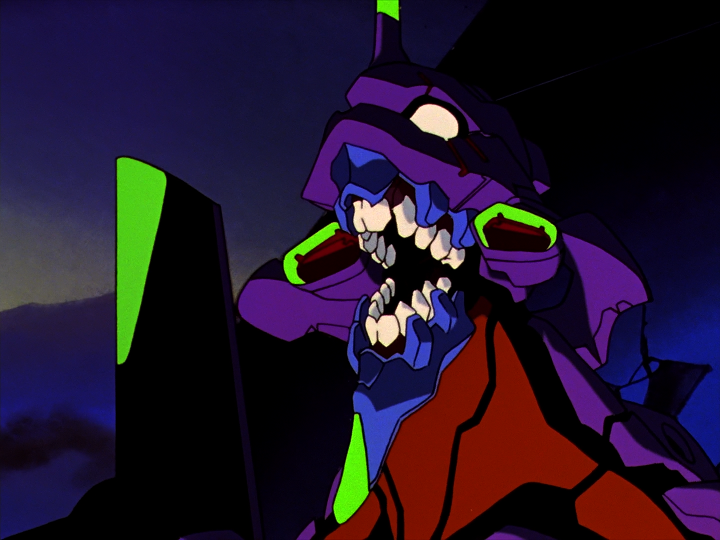
Art/Animation
As always, we have to start off with the Animation of an anime, and for Evangelion that’s a loaded topic. What I mean is, Evangelion came out in 1995, almost 25 years ago. This was right on the cusp of when anime started transitioning to digital animation, with works such as Princess Mononoke and Ghost in the Shell starting to blend the two. The reason I bring all of this up is because of this question: How do you judge older cel animation? Do you judge it as a product of its time? Or is it a critic’s duty to review it in the context of the present? Generally for me, and for the purposes of this review, I tend to judge things on when they came out. Not only because I feel it’s fairer, but because cel has a unique texture compared to digital, something we rarely get anymore.
So the preamble over with, how does Evangelion’s animation stack up? Well let’s start with the good, because when Evangelion is on it is on. There are numerous sequences throughout the series that are simply stunning, though some in a weird way. The best examples of this I can give are, of course, the EVA fights with the Angels. This is where Gainax really stretched their muscles, giving these giant robots incredibly fluid and organic movements. It only gets better when the EVA units get out of control, reverting almost to beasts, the animation changing with them. And even during the aforementioned “weird” parts Evangelion still looks good. For instance episode 9, Moment and Heart Together, where Anno basically gives us a mecha dance number. Is it weird? Yes. Does it look good? Hell yes. Effectively anytime the EVA units are on screen, we can expect something great.
But what about whenever they aren’t? As with a lot of anime, not just the 90’s cel, outside of set piece scenes can be rather… static. Here Evangelion is no exception, and though Anno attempts to mitigate it with his direction, it isn’t always successful. We will dig into it a bit more in the next section, but for now I am referencing things like the escalator, the elevator, etc. These scenes take what is often one of cel animation’s biggest strengths, its handmade backgrounds, and ignores them. Instead giving us largely static images with dull backgrounds. There is nothing here for us to latch onto, nothing to engage the eye. Even if the conversation might be interesting, visually it’s dull. And the sad thing is that this isn’t even the worst of it.
The further you get into Evangelion, the more and more you might find yourself recognizing certain shots. Scenes, animation pulled directly from previous episodes, basically reinstated. Yes, some of these have thematic relevance, but that doesn’t change how lazy they are. Love them or hate them, packed with thematic relevance or not, it doesn’t change how visually uninteresting many of these shots are. So what does this mean for Evangelion? Well, as egregious as a lot of these were, they never took away from the highs. They only really cropped up on review or when looking back on an episode after it finished. However they rarely took away from the scene in the moment because of how invested I was in the narrative. Basically, Evangelion’s highs are good enough to make me want to ignore the lows.
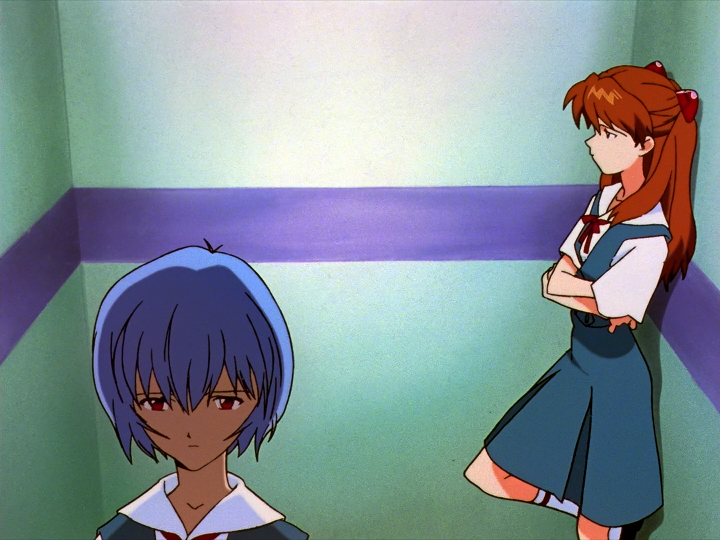
Direction
Moving on we come to Evangelion’s Direction, a very polarizing part of the show from what I have heard. Many view it as the work of a visionary, meticulously setting scenes. Others as evidence of a troubled production starting to lose its wheels and hobble across the finish line. Personally, though, I look at them as a clever man making the best of a bad situation. Clearly there are better alternatives, things Anno could have done had his production been in a better state at the time. I also don’t blame those who detest these scenes, as they require a minimum level of investment in the characters to be even marginally interesting. They are weird, static, often dull shots and are incredibly hit or miss, even for me. Take the ending of episode 4 at the train station as an example of one I don’t think landed well.
However when Anno’s scenes land, I think they land really well. The end of episode 24 for example, minimal spoilers, did a great job depicting Shinji’s hesitance and eventual acceptance. Meanwhile Evangelion has plenty of shots throughout the series with fantastic composition, with no hint of production woes. One of my favorite reoccurring examples of this are the EVA Units. Anno has them hiding in the background throughout the series, always looming, always watching, always present. As the series goes on and we learn more about them and the greater story, this presence becomes more and more disconcerting. And as this tone in the series shifts, Anno shifts how he presents the EVA’s in these shots as well. Making them darker, more looming, focusing in on the eyes more and more. It’s the same basic shot, yet it works from episode 1 all the way to episode 26.
This isn’t to say that Evangelion isn’t without it’s issues here though, Anno has plenty of inconsistencies. For instance in episode 20 we see Shinji’s plugsuit in the EVA, yet he entered it while not wearing one. Throughout the series Evangelion also routinely confuses or messes up the layout, making it nigh impossible to tell where a lot of things are in relation to each other. However for all these issues, and there are many more I could pull but I don’t want this to be to spoiler-y, I don’t think they negatively affect the narrative to much. The story beats still land, although muted a bit, and the experience was ultimately still enjoyable. I don’t think Anno is a genius or a visionary, but rather a skilled director who did the best with what he had.
So ultimately, for all of its flaws, I think Anno did well with Evangelion’s direction. It’s different of course and not something I think would work universally. And the final 2 episodes are a big old mess. But for the kind of story Evangelion is, the messages it wanted to get across managed to do so. And while its lows can be annoying, its highs are fantastic and evocative, leaving me with imagery I will remember for a long time to come. So even in spite of its clear production woes and worsening timeline, Evangelion succeeded at keeping me engaged throughout the story with only a few hiccups here and there. Sadly however all good things must one day come to an end, and while I am aware that End of Evangelion exists and truly finishes out the series, as its own production I find Evangelion’s story… wanting.
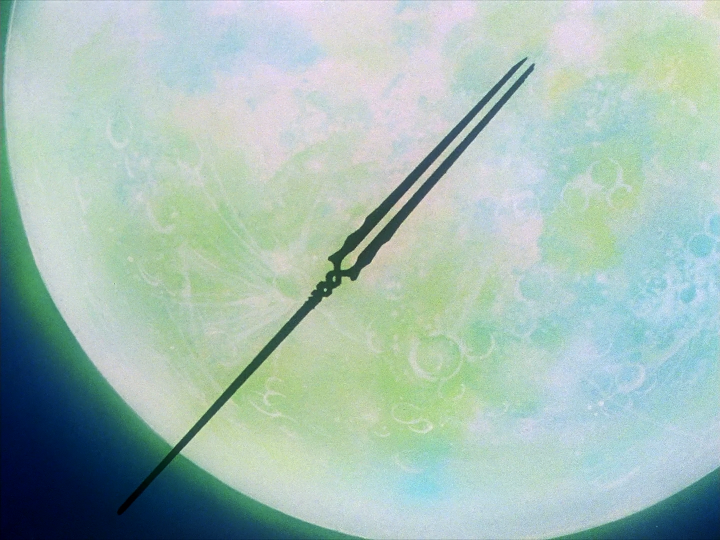
Setting/Story
What do I mean by wanting? Well the easiest way to say it, metaphorically ripping off the band-aid here, is that Evangelion is unfinished. As a stand-alone TV product, Neon Genesis Evangelion is not complete. It fails to finish it’s story, it fails to follow up with the myriad of plot threads laced throughout, and the only thing it really delivers on are it’s characters. And don’t get me wrong, I love Evangelion’s characters, we will talk about them in depth later on in this review. But as far as the core story involving the Angels, Eva Units, Gendo and Seele goes? Well since I am saving End of Evangelion for after this review, your guess is probably better than mine. For now though let’s go through this bit by bit. From the setting, to the Angel’s plot to the Seele/political intrigue B-plot, and break it all down.
Setting wise, Evangelion is great. The city of Tokyo-3 is well realized, makes for some beautiful backdrops and the underground aspect is just fascinating. It’s a mecha series playground! At the same time, the core mystery of the world is established well and early. Immediately throwing us into the action with the Angels, making us question what they are, where they come from and how NERV will beat them. From the start these things feel alien, and humanity feels on the back foot. All the while as we chip away at Evangelion’s world, learning the truth behind the Evas, the Angels, Adam, etc. Personally, I was engaged from the beginning and grew more interested and more invested as the series went along. No, the setting of Evangelion is fantastic. Sadly however, this very engagement actually worked against me, as Evangelion’s story does not live up to it’s world.
Now that sounds rather harsh, but hear me out, because for 24 episodes I loved and enjoyed Evangelion. Yes, the political/intrigue B-plot was rather unsatisfying, involving SEELE and such. But it served a purpose within the greater narrative, so even a lackluster B-plot was fine because I was engaged in the world. The mystery of the Eva Units for instance was fantastic and Evangelion did a great job of slowly building them up throughout the series, peeling away the layers episode by episode. All the while managing to sew beautiful character drama into the greater narrative. However, for all of these plot points with the Angels, Nerv, SEELE, Adam, etc, Evangelion delivers on none of them. The final 2 episodes, the finale of the entire series, becomes focused purely on the characters and ignores everything around them, everything that gave them context in the larger story.
I have seen some claim that is the point, that the characters are the focus, not the story. However I vehemently disagree. Now, none of this is to say I don’t like the characters, I love Evangelion’s characters. As far as they go, the ending did well by them. However when you spend 24 episodes building up a world and a narrative, a greater plot with intrigue and questions, people are going to get invested in them. People like me. And so it should come as no surprise that when an ending ignores large chunks of its narrative for a 2 episode long monologue focused entirely on the characters, some people will be frustrated. In this case, I am one of those people. However satisfied Evangelion’s ending may leave you personally, as an ending it fails horribly on actually concluding Evangelion’s story. It’s as if Anno ran out of ink…
For all that I rag on this ending, for all the issues I have with it, for what little it did right, there is a silver lining though. The End of Evangelion movie exists, and from what I have been told it is an alternative to the TV series finale. Mostly in that it approaches and looks at the ending from a different direction. Basically, I was told that Evangelion’s TV ending is for the characters, while End of Evangelion is for the world/narrative. And while that is great for fans, and I am really looking forward to watching it, it’s terrible for a standalone series. However bad a film/series is, I don’t believe a sequel rectifying its problems should erase them from criticism. A series should be able to stand on its own, and Evangelion trips, falls and only barely stumbles across the finish line. Incredibly disappointing.
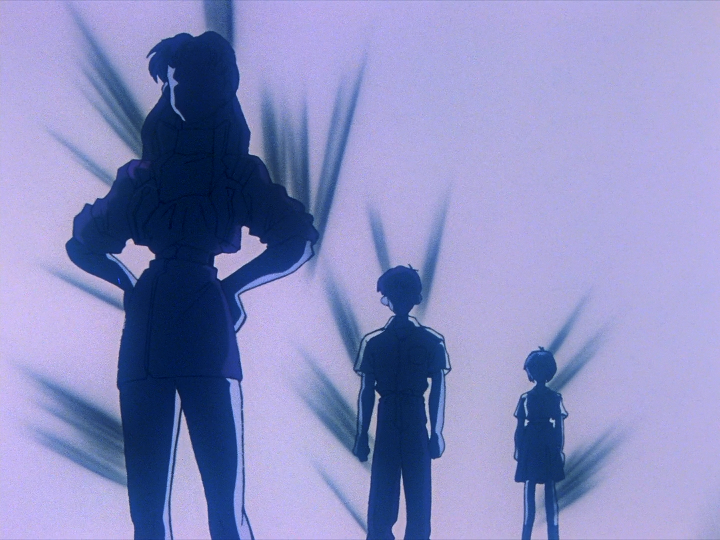
Characters
That done with, we can finally get to what is Evangelion’s best part, its characters. There is no two ways about it, I love this cast, their growth and how Evangelion uses them. Everyone from Shinji to Asuka to Misato to even Gendo have their own stories, of varying degrees of quality of course. Each one tying into Evangelion’s core themes of human connection and relationships. Even the ending which I just got done ripping into manages to clean up and complete these core character arcs. Yeah, it has a lot of issues, and it isn’t the best way it could have done it. It’s obvious the scheduling was a problem there. But the characters are the one thing to come out of that finale squeaky clean. So for this review, I want to take a look at my 3 favorite characters, to try and explain why I love them.
First up we have Shinji “Get in the fucking robot” Ikari, who didn’t have the best start for me. Early on he came across as whiny, needy and pitiful. However that seems to be the point, for as Evangelion progressed and we saw more and more of him, I grew to empathize with Shinji. His fear of getting hurt, of opening up to others and his desire to be accepted are all incredibly common emotions, ones I myself have felt at times. So watching his progression over the course of 26 episodes, watching him rise, fall and rise again, was incredible. Almost every episode it felt like we got some sense of progress from him. Whether it was opening up to a character, standing up for himself or even when he ran away. Every single one of these were properly setup, presented and acted on, and I loved it.
Next is Asuka, who provides a more active example of the same core things as Shinji. As far as first impressions go, Asuka came off as your stereotypical tsundere. Hot headed and rude, it wasn’t the best example. Yet once again as Evangelion progressed and we learned more and more about her character, I came to love her. Asuka’s prideful nature isn’t just to check a box, but rather is deeply rooted in her insecurities. Her desire to be seen as an adult, to be accepted, to be loved and given attention, all built around her skill as an Eva Pilot. So as that skill is challenged, waxes and wanes over the course of the series, it becomes a direct challenge to her character. Forcing Asuka to deal with the fact that she is projecting herself onto her work, rather than forming relationships based on her own personality and desires.
Finally we come to Misato, my personal favorite character in the series. Similar to the other two, Misato paints a very different picture early on in the series. Coming across as confident, flirtatious and outgoing, welcoming Shinji into her home and becoming an almost motherly figure. Yet as the series goes on, Evangelion begins to break all of this down and let us see the cracks. Showing us 2 very different versions of Misato, from the public, outgoing one to the more private and quiet one. Where Shinji and Asuka are youths, wearing emotions on their sleeves and fearing any connection, Misato is the jaded adult who has grown used to it. Meeting people, but keeping them at arm’s length, never showing them her true self for fear of rejection. All the while longing for the exact same thing as our two young leads.
Yet for all that I love these characters as individuals, their true strengths come into play as a full cast. The way each of them bounce off and relate to each other is nothing short of fantastic. Watching Asuka compete with Misato for Kaji or resent Rei for effectively being her polar opposite. Meanwhile Misato and Kaji have some of the best, most human feeling conversations I have heard in anime in a long time. Seeing Shinji’s fear of connection in Gendo’s desperation for certain someone or Shinji slowly growing on Asuka throughout the series run. There are so many little things, little interactions and scenes, that I could spend the rest of this review just talking about them. For all of the problems I have with Neon Genesis Evangelion, its characters are one of the few parts to truly live up to and exceed its reputation.
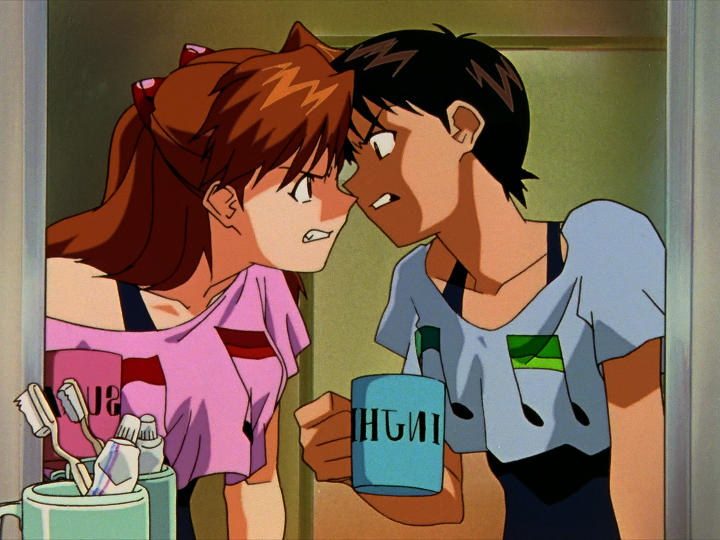
OST/Sound Design
Next up we have Evangelion’s OST and… I am really not sure how to approach this one. Just looking straight a the OST, stand alone, there is some great stuff in here. From the adventurous epics like “Nerv” or upbeat tracks like “Misato” to the somber tones of “Thanatos” and the various versions of “Fly Me to the Moon“. Evangelion is filled with iconic music that is still memorable to this day for a very good reason. It even pulls in classics such as “Ode to Joy” for some scenes, really nailing the scale of some of these events. However there are times that these odd music choices just… don’t work, or come off as incredibly silly. Take for instance “Both of You, Dance Like You Want to Win“. As a standalone track, it’s great. Yet the way Evangelion used it completely took me out of the moment, however memorable.
Still when all things are said and done, 99% of the time Evangelion’s soundtrack was great. It was evocative, beautiful and though sometimes ill-fitting, I wouldn’t have enjoyed the series as I did without it. In fact, I want to take a moment to point out some tracks I personally loved in particular. Previously I mentioned “Fly Me to the Moon” and while that’s great, and the options Evangelion gives us are fantastic, I especially liked episode 6 and 11’s versions. Meanwhile “Jikai Yokoku” is simply iconic and a fantastic way to end each episode and lead you into the next. And of course I can hardly go this whole section without talking about “Cruel Angel’s Thesis“, one of the most infectious OP’s I have ever heard. All of this is to say, in as few words as possible, that Evangelion’s OST is fantastic. I only question how it’s used.
Finally we have the actual sound effects of the series. Now I am hardly a qualified sound engineer, so this section is going to be kept rather short. However there is one thing even I know: The Eva Units sound amazing. From the crunch as they walk to their screams of rage, these things make for fantastic giant robots. It’s no wonder they are so iconic, everything from their design to their sounds stand out. Naturally this also holds true for many of the Angels, with some such as Ramiel really selling their otherworldly nature. All around I think Evangelion does a pretty good job of giving life to its world through its sounds. And wherever it wasn’t amazing, at the very least it never hurt the experience. Well… except for maybe the SHING of the AT Field.
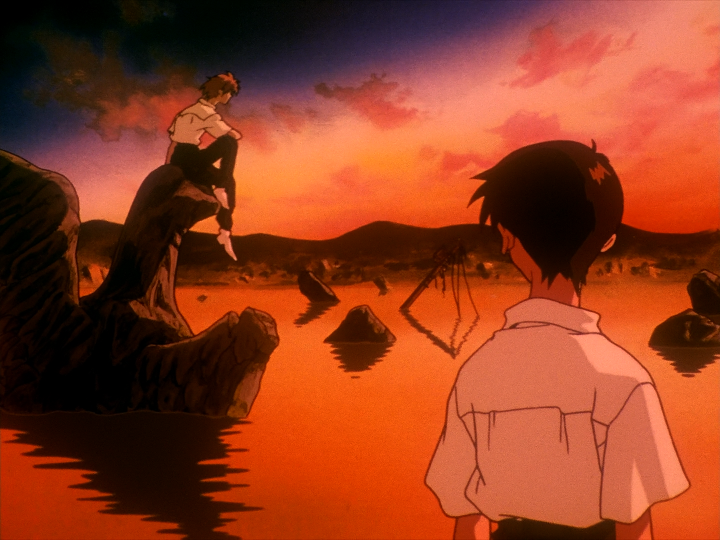
Themes/Message/Symbolism
Finally we get to what will no doubt be the most difficult to write and heavily judged portion of this review: the themes. Now before we begin, fair warning, I have tried to keep spoilers light but I simply cannot do that in this section. So if you have not watched Evangelion 1) Why are you reading this, and 2) Skip this. That said, I suppose the easiest place to start is with the heavily religious overtones of the series. Namely its use of Judeo-Christian symbolism. Personally, beyond the general aesthetic of it all, I don’t think the religious imagery is all that pertinent to the series. Yes it exists, yes it makes for some pretty visuals. But I never felt like Evangelion was a particularly religious series or that it was truly exploring any religious concepts. Instead they were primarily a backdrop, if a rather interesting one.
Rather, I thought Anno’s core themes were much more grounded and human in nature. Focusing in on relationships, connection, depression and your own personal place in an ultimately uncaring universe. The first few are of course explored through Evangelion’s characters, we already talked about it a little bit. How terrifying it can be to put yourself out there, that fear of rejection, and the various coping mechanisms for that. Whether it be Shinji, who runs away and instead seeks 1 way relationships where he gives nothing but takes everything, like Kaworu. Or Asuka throwing herself into her work, placing all of her value as a person on that work. Only to fall apart and lose all personal meaning when she is no longer able to perform that work well. From Misato to Rei to Gendo, human connections and relationships are paramount in Evangelion.
Meanwhile depression is laden throughout the series, and based on what little I knew going in, Anno struggled with it as well. Once again, we need only look at Shinji and his arc throughout the series. As from episode 1 Evangelion presents us with characters who don’t believe in their own worth. Who don’t believe they are worthy of love, while simultaneously desiring yet pushing it away. We see this in Shinji and his deep rooted insecurities, believing that no one can love him and pushing people away when they try, resulting in a self-sustaining cycle. One that is only broken in the finale when he comes to realize his own self-worth and moves forward. At the same time we have characters like Rei who are defined by their relationships with others, yet know nothing about themselves. Seeking death, an end to it and all the confusion.
These sorts of themes permeate Evangelion from the very beginning. Working their way into every pore and every character. From Gendo and his quest to reunite with his dead wife to Ritsuko, finding comfort in the man who killed her mother. From Misato seeing her father in Kaji and pushing him away only to return later, to Shinji’s eternal quest for acceptance. These are good themes, and for the most part Evangelion uses them well. However as a whole I can’t help but feel the series is too jumbled at times. Mixing its religious themes with its more psychological ones while simultaneously using copious amounts of motherhood/pregnancy symbolism. It makes for some evocative scenes, but at the same time many of those scenes were just bloated, such that their original intention feels like it got lost in places. Ultimately however, I think Evangelion did a pretty good job.
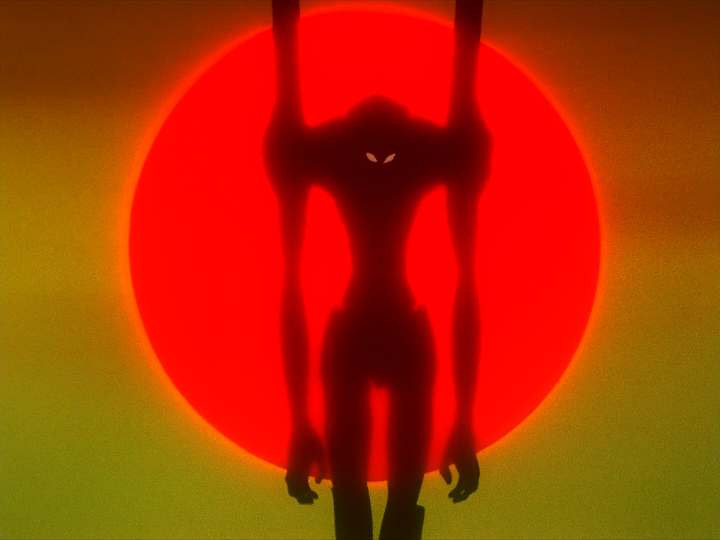
Conclusion
So, all in all, how was Neon Genesis Evangelion? Did it rise up to the hype, is it truly a cornerstone of Anime, something that all fans should watch? Looking at the show as a whole, ignoring End of Evangelion for now, I can only say… yes. For all of Evangelion’s issues, it lived up to its reputation. For the first 24 episodes, everything leading up to the finale, I loved it. The action was great, the characters great, the thematic underpinnings were great. Evangelion’s biggest weakness is simply that it stumbles across the finish line, face-planting into the dirt. And while that ending might be emotionally satisfying for some, for me it just leaves Evangelion feeling like an unfinished product. A glorious, incredibly meaningful product, but unfinished nonetheless.
So while it isn’t perfect, it’s definitely worth your time and entertaining to boot. And as for the finale? Well, I have hope End of Evangelion will give me what I wanted. Stay tuned for that review in about a week. Thanks for reading!

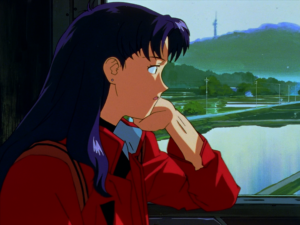
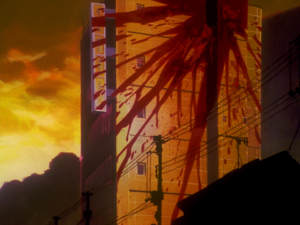
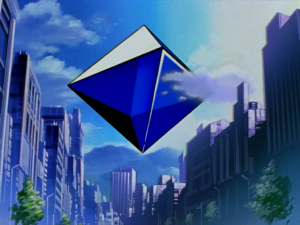
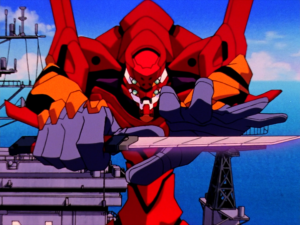
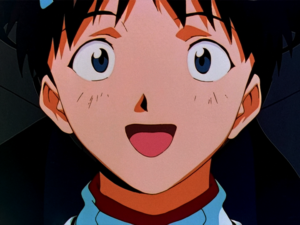
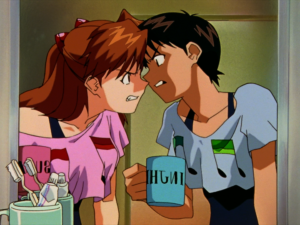
Thanks for the review man